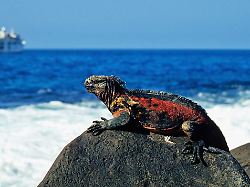Galapagos deal with Credit Suisse
Ecuador swaps debt for conservation
5/5/2023 8:49 am
The Galapagos Islands are one of the most valuable ecosystems in the world. In order to secure their preservation, the Swiss Credit Suisse made an offer to the government of Ecuador last month. This accepts – and thus seals the world’s largest exchange of debt for nature.
The major Swiss bank Credit Suisse has bought back Ecuadorian government bonds with a face value of 1.6 billion dollars. According to Ecuadorian bankers, the buyback will free up cash that Ecuador will invest in preserving the Galapagos Islands, one of the world’s most valuable ecosystems.
Credit Suisse made the offer late last month. It is the largest exchange of debt for nature, as such transactions are called in banking circles, to date. Almost the entire land and sea area of the Galapagos Islands is under strict nature protection.
The Galapagos Islands belong to Ecuador and are located around 1000 kilometers west of the South American coast in the Pacific. The archipelago has been a UNESCO World Heritage Site since 1978 because of its special flora and fauna. Species found only there include marine iguanas, land iguanas and Galápagos finches. In 1835 the famous British naturalist Charles Darwin visited the islands. His theory of the origin of species received a lot of food for thought there.
New Coral Reef
The more than 100 islands can also be visited by tourists, but strict safety regulations apply to protect flora and fauna for vacationers. With these precautions, the Ecuadorian government wants to control the influx of tourists and also limit the unhindered influx: A handful of the islands are inhabited.
Just a few weeks ago, scientists discovered a new, largely untouched coral reef off the Galapagos Islands. According to the Charles Darwin Foundation, the reef stretches over the crest of a submerged volcano at a depth of 400 to 600 meters and is several kilometers long. Researchers from Ecuador, the USA and Great Britain found the unique ecosystem during a submarine dive in the middle of the archipelago during the Galápagos Deep 2023 expedition.
